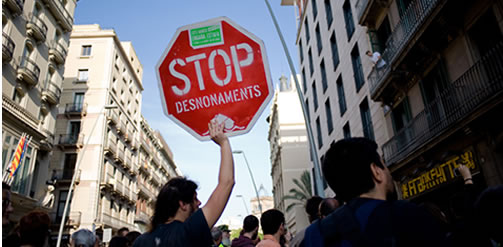Last Sunday, Spain’s voted for its regional and municipal representatives. The results have been decisive – Spain has swung to the Left. Is this a prelude to the national elections in November?
The long-established two party system between conservatives and socialists has been broken
Although the current conservative government remains the largest party overall, it has lost a large number of votes. The socialists are showing signs of recovery, but more significantly, new parties, issued from the Indignados (Occupy) citizen movements and from previous minority formations, have swiftly gained important positions.
With the current government lacking absolute majorities, central/left-wing coalitions between the socialists and the new emergent parties are likely to take over most governmental posts.
Symbolically, Barcelona and Madrid will probably be governed by two women born out of movements – Ada Colau, former coordinator of the PAH (the Mortgage-Affected Citizens Platform) and Manuela Carmena, a retired judge and longstanding pro-democracy activist.
Popular, protest politics influencing formal politics – new leaders, ideas and party models
The nod to Spain’s popular/street politics lies not so much in the transition of popular movement leaders to the political party system but also in the transition of popular movement discourses to formal political debate. Ideas such as “social audits” and “retroactive dation in payment” (a form of debt discharge), unknown outside these movements for some time, have now been incorporated in most progressive parties.
Additionally, Podemos (We Can), which has grown out of the Indignados movement, presents an interesting alternative to how political parties can be run and financed, regardless of the level of sympathy that one may have with its ideology.
For instance, it rejects, by statutes, to finance its electoral campaigns through bank loans and rather turns to donations, crowdfunding and microcredits. The party also rejects the idea of traditional fee-paying affiliates but rather opts for allowing anyone to get subscribed online and contribute to the party financially or by vote.
A more contested aspect is Podemos’ internal organisation. At the municipal level, the party has coalesced with indignados-related local parties such as Colau’s En Comú (Barcelona in Common) and Carmena’s Ahora Madrid (Now Madrid). This seems to have worked. Yet, the internal processes of constructing Podemos’ own candidacies regionally have been questioned by some as being too directed from the top– thus putting in question the bottom-up decision-making ideal represented by Podemos’ circles or base groups. Time will say whether its party format will end up offering new participatory democratic elements to party politics or just be old wine in new bottles.
Persistent and high levels of voting abstention highlight ongoing limitations of representative party political democracy
A final area regarding popular politics are the levels of abstention. Abstentions on Sunday have represented 12,240,792 people (35.06%). These levels look quite similar to previous 2007 and 2011 election levels – 36.73% and 33.77% respectively.
With the entry of new movement parties, new voters, especially the youth, were expected to join the elections for the first time. This may have happened. Yet with abstention rate remaining stagnant, this would mean that others have stopped voting. Another explanation is a simpler transfer of votes amongst parties.
All in all, stagnant abstention gives food for thought on the limits of representative democracy and the party politics system to absorb the current situation of crisis, indignation and revolt – at least in voting. Even with, and despite of, the existence of movement-to-party transitions.
For academics, these elements bring back the question of whether we have a fair enough range of analytical tools to understand the current politics as led popularly in the streets of Spain, Egypt, UK and many other protest contexts – with and without the party system involved.
Maria-Josep Cascant Sempere is a PhD candidate with the IDS Power and Popular Politics cluster researching protest and mobilisation processes in development non-governmental organisations (NGO) bureaucratic structures. With thanks to Sergio Belda, Clara Cascant, Marc Cascant and Ana María Claver for comments.


